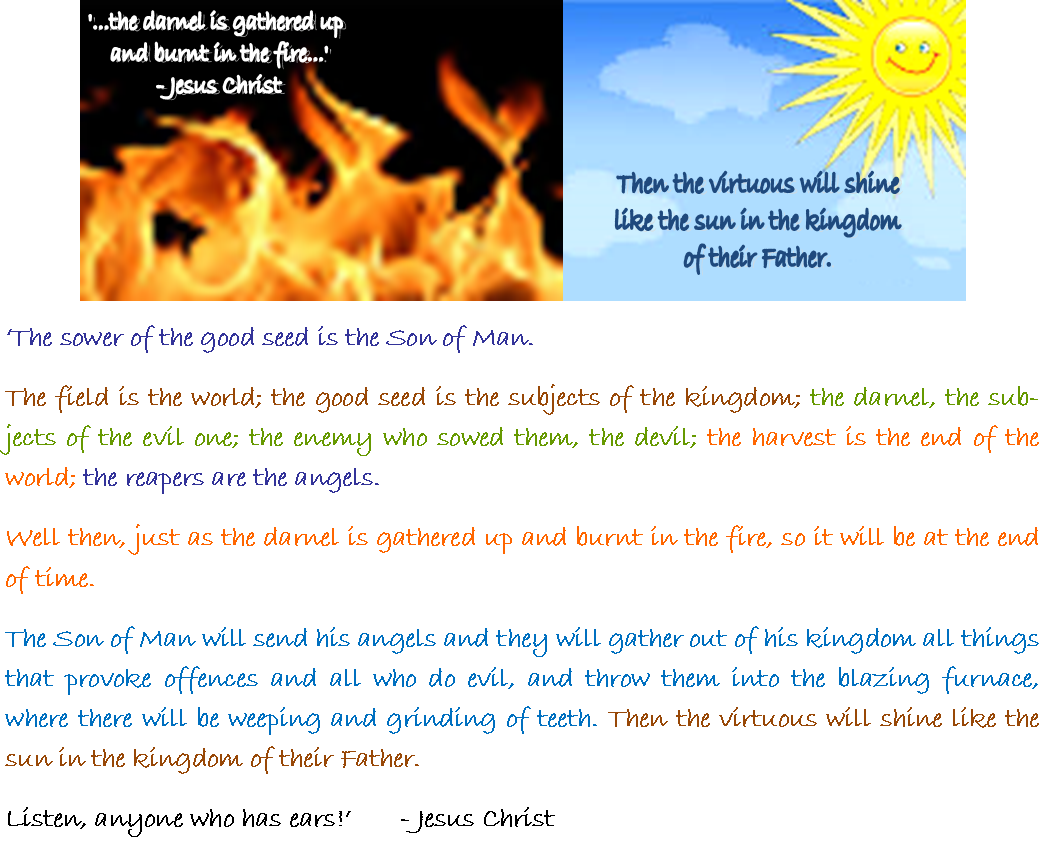|
215 |


|
Sixteenth Sunday in Ordinary Time, First Reading: Extracted from the Book of Wisdom 12:13, 16-19 There is no god, other than you, who cares for everything, to whom you might have to prove that you never judged unjustly; Your justice has its source in strength, your sovereignty over all makes you lenient to all. You show your strength when your sovereign power is questioned and you expose the insolence of those who know it; but, disposing of such strength, you are mild in judgement, you govern us with great lenience, for you have only to will, and your power is there. By acting thus you have taught a lesson to your people how the virtuous man must be kindly to his fellow men, and you have given your sons the good hope that after sin you will grant repentance. |

|
Sixteenth Sunday in Ordinary Time, Responsorial: Psalm 86:5-6,9-10,15-16 Response: O Lord, you are good and forgiving.
O Lord, you are good and forgiving, full of love to all who call. Give heed, O Lord, to my prayer and attend to the sound of my voice.
All the nations shall come to adore you and glorify your name, O Lord: for you are great and do marvellous deeds, you who alone are God.
But you, God of mercy and compassion, slow to anger, O Lord, abounding in love and truth, turn and take pity on me. |

|
Sixteenth Sunday in Ordinary Time, Second Reading: Extracted from the letter of Saint Paul to the Romans 8:26-27 The Spirit comes to help us in our weakness. For when we cannot choose words in order to pray properly, the Spirit himself expresses our plea in a way that could never be put into words, and God who knows everything in our hearts knows perfectly well what he means, and that the pleas of the saints expressed by the Spirit are according to the mind of God.
Gospel Acclamation cf. Ephesians 1:17, 18 Alleluia, alleluia! May the Father of our Lord Jesus Christ enlighten the eyes of our mind, so that we can see what hope his call holds for us. Alleluia! Or Matthew 11:25 Alleluia, alleluia! Blessed are you, Father, Lord of heaven and earth, for revealing the mysteries of the kingdom to mere children. Alleluia! |
|
Sixteenth Sunday in Ordinary Time, Gospel Reading: Extracted from the holy Gospel according to Saint Matthew 13:24-43 Jesus put another parable before the crowds, ‘The kingdom of heaven may be compared to a man who sowed good seed in his field. While everybody was asleep his enemy came, sowed darnel all among the wheat, and made off. When the new wheat sprouted and ripened, the darnel appeared as well. The owner’s servants went to him and said, “Sir, was it not good seed that you sowed in your field? If so, where does the darnel come from?” “Some enemy has done this” he answered. And the servants said, “Do you want us to go and weed it out?” But he said, “No, because when you weed out the darnel you might pull up the wheat with it. Let them both grow till the harvest; and at harvest time I shall say to the reapers: First collect the darnel and tie it in bundles to be burnt, then gather the wheat into my barn.”’
He put another parable before them, ‘The kingdom of heaven is like a mustard seed which a man took and sowed in his field. It is the smallest of all the seeds, but when it has grown it is the biggest shrub of all and becomes a tree so that the birds of the air come and shelter in its branches.’ He told them another parable, ‘The kingdom of heaven is like the yeast a woman took and mixed in with three measures of flour till it was leavened all through.’
In all this Jesus spoke to the crowds in parables; indeed, he would never speak to them except in parables. This was to fulfil the prophecy: I will speak to you in parables and expound things hidden since the foundation of the world.
Then, leaving the crowds, he went to the house; and his disciples came to him and said, ‘Explain the parable about the darnel in the field to us.’ He said in reply, ‘The sower of the good seed is the Son of Man. The field is the world; the good seed is the subjects of the kingdom; the darnel, the subjects of the evil one; the enemy who sowed them, the devil; the harvest is the end of the world; the reapers are the angels. Well then, just as the darnel is gathered up and burnt in the fire, so it will be at the end of time. The Son of Man will send his angels and they will gather out of his kingdom all things that provoke offences and all who do evil, and throw them into the blazing furnace, where there will be weeping and grinding of teeth. Then the virtuous will shine like the sun in the kingdom of their Father. Listen, anyone who has ears!’
Sharing:
It was the 16th Sunday in Ordinary Time on 20 July 2014.
The Readings that were read in the Eucharistic Celebrations all over the world on that day are shown above:
First Reading: Wisdom 12:13, 16-19, Responsorial: Psalm 86:5-6, 9-10, 15-16, Second Reading: Romans 8:26-27 & Gospel Reading: Matthew 13:24-43.
We have extracted the Homilies of Saint Pope John Paul II, Pope Benedict XVI & Pope Francis I based on the aforesaid Readings to share with you, so that you could similarly be encouraged:
JOHN PAUL II ANGELUS 18 July 1999
Dear Brothers and Sisters,
1. Today I have the joy of reciting the Angelus in the heart of Val d'Aosta where I am resting for a while. I say "in the heart" not only because the town of Quart is centrally located in the Vallée, but especially because it is here that we find the Carmel of Mater Misericordiae which I blessed exactly 10 years ago, on 16 July 1989, and which in a certain sense is the contemplative centre of the Church in Val d'Aosta. I extend my most cordial greeting to the Carmelite nuns who live here, daily offering their service of prayer.
A monastery is a true "powerhouse" of spiritual energy that is nourished at the source of contemplation, after the example of prayer to which Jesus devoted himself in solitude, immersing himself totally in dialogue with God the Father, to draw the necessary strength for his saving mission. The Church prolongs Christ's mission in time: among the many charisms which enrich her, she also cherishes the very precious one of the contemplative life, cultivated in monasteries, as a response to the absolute love of God who in the incarnate Word united himself to humanity in an eternal and unbreakable bond. Monasteries of women express the exclusive union of the Church with Christ her Bridegroom with particular eloquence, reliving the experience of Mary, the Virgin of silence and listening.
Continue next page ...
3 August 2014 |
